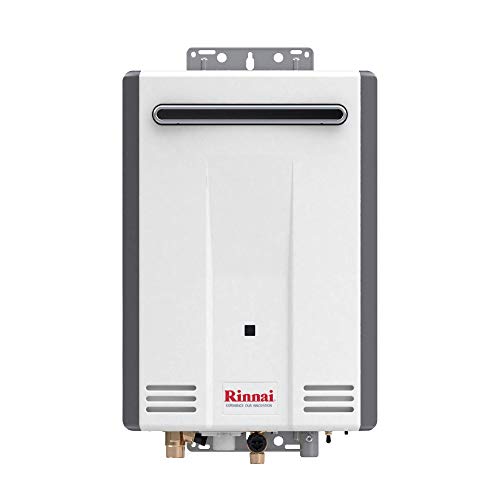Propane Tankless Water Heater Size Calculator: What Size Do I Need?
Find the right size propane tankless water heater for your home by entering your details below.
List of the Top 10 Best Propane Tankless Water Heater:
Understanding Propane Tankless Water Heater Sizing
Propane tankless water heaters provide endless hot water while being energy efficient. Proper sizing ensures optimal performance and comfort. The size you need depends on groundwater temperature, desired output temperature, and maximum simultaneous hot water usage.
Standard Propane Tankless Water Heater Sizes
| Size (BTU) | Typical Application | Max GPM (Warm Climate) | Max GPM (Cold Climate) |
|---|---|---|---|
| 120,000 | Small homes, apartments | 4.5 | 2.8 |
| 150,000 | Average homes | 5.8 | 3.7 |
| 180,000 | Large homes | 7.0 | 4.5 |
| 199,000 | Very large homes | 8.5 | 5.4 |
How Propane Tankless Water Heaters Work
Propane tankless water heaters operate through an efficient on-demand process:
- Flow Activation: When hot water is requested, cold water flows through the unit, triggering the flow sensor.
- Heating Process: The propane burner ignites, heating water as it passes through the heat exchanger.
- Temperature Monitoring: Multiple sensors ensure precise temperature control.
- Continuous Supply: Hot water is provided as long as needed, within the unit's flow capacity.
Types of Propane Tankless Water Heaters
| Type | Efficiency | Advantages | Disadvantages |
|---|---|---|---|
| Non-Condensing | 82-85% | Lower upfront cost, simpler installation | Lower efficiency, requires Category III venting |
| Condensing | 92-94% | Higher efficiency, lower operating cost | Higher upfront cost, requires condensate drain |
| Hybrid Condensing | 95-98% | Highest efficiency, built-in recirculation | Premium price, complex installation |
Key Factors in Size Selection
1. Flow Rate Requirements
Understanding typical flow rates for common fixtures:
| Fixture | Typical Flow Rate (GPM) | Low-Flow Option (GPM) |
|---|---|---|
| Shower | 2.5 | 1.8 |
| Bathroom Faucet | 1.5 | 1.0 |
| Kitchen Faucet | 1.8 | 1.5 |
| Dishwasher | 1.3 | 1.0 |
| Washing Machine | 2.0 | 1.5 |
2. Temperature Rise Calculation
Temperature rise affects required BTU output:
- Required BTU = GPM × ΔT × 500
- GPM = Desired flow rate
- ΔT = Temperature rise (Output temp - Input temp)
- 500 = Constant for water heating calculation
3. Altitude Considerations
Altitude affects propane appliance performance:
- Reduce rated BTU by 4% per 1,000 ft above 2,000 ft
- Special high-altitude orifices may be required
- Proper venting adjustments are necessary
- Consider local codes and requirements
Installation Requirements
Ventilation Requirements
- Direct Vent: Separate air intake and exhaust
- Power Vent: Mechanical venting system
- Proper Clearances: Follow manufacturer specifications
- Combustion Air: Adequate fresh air supply
Gas Line Requirements
- Proper gas line size (typically 3/4" minimum)
- Adequate gas pressure (11" WC minimum)
- Professional installation required
- Local code compliance
Maintenance Requirements
Annual Maintenance Tasks
- Scale Removal: Flush heat exchanger
- Filter Cleaning: Water and air filters
- Burner Inspection: Clean and adjust as needed
- Venting Check: Inspect and clean
Professional Service Indicators
- Error codes on display
- Inconsistent temperatures
- Unusual noises during operation
- Reduced hot water flow
- Frequent cycling on/off
Energy Efficiency Tips
- Location: Install close to most frequent use points
- Insulation: Insulate hot water lines
- Maintenance: Regular descaling in hard water areas
- Temperature Setting: Set to 120°F for optimal efficiency
Cost Considerations
Initial Costs
- Unit Cost: $800-$2,500
- Installation: $1,000-$2,500
- Venting: $300-$800
- Gas Line: $200-$800 if needed
Operating Costs
- Propane Usage: $200-$500 annually
- Maintenance: $150-$250 annually
- Water Treatment: $100-$300 in hard water areas
Frequently Asked Questions
What's the average lifespan of a propane tankless water heater?
Propane tankless units typically last 15-20 years with proper maintenance. Factors affecting lifespan include:
- Water quality and hardness
- Maintenance frequency
- Usage patterns
- Installation quality
- Environmental conditions
Do I need a water softener with my tankless unit?
Recommended in areas with hard water (>7 grains) because:
- Prevents scale buildup
- Maintains efficiency
- Extends equipment life
- Reduces maintenance needs
- Ensures consistent performance
Can I install a propane tankless water heater myself?
Professional installation is required because:
- Complex gas line requirements
- Specific venting needs
- Safety considerations
- Code compliance
- Warranty requirements
How much propane will my tankless water heater use?
Typical usage factors include:
- Household size and usage patterns
- Incoming water temperature
- Desired output temperature
- Unit efficiency rating
- Climate conditions
What's the cold water sandwich effect?
Understanding this common tankless phenomenon:
- Brief cold water burst between hot water uses
- Normal operation characteristic
- Can be minimized with buffer tanks
- More noticeable in longer pipe runs
- Not a performance issue








